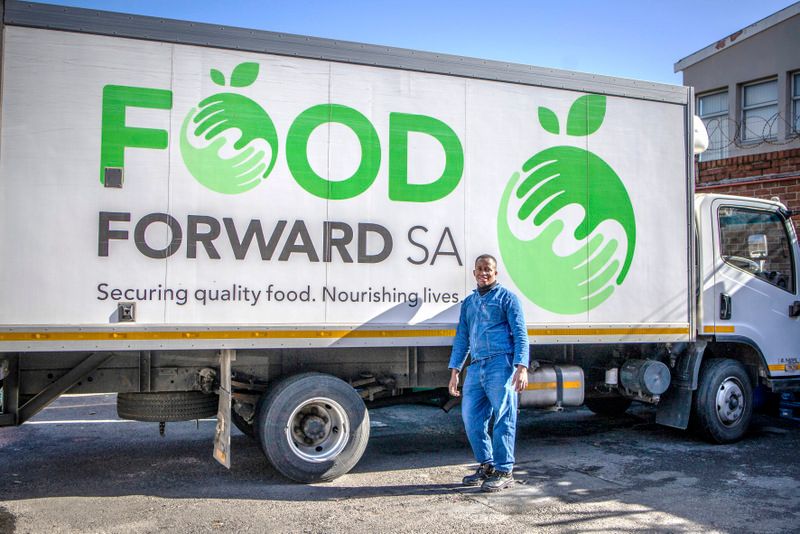Food Forward SA driver Phumlani Manomela in Cape Town, South Africa. Photo Credit: Food Forward SA
by Biénne Huisman, bird story agency
Inside FoodForward SA’s new warehouse in Cape Town, 36 pallets of tinned peas are stacked against the wall. Meggan Volkwyn, the marketing manager, quickly does the math: that’s a total of 71,280 cans of peas. There are pallets of tinned beans, pureed baby food, fresh butternuts, potatoes, and cornflakes stacked from floor to ceiling. All are marked with expiry dates.
Volkwyn is showing me around their new warehouse. It has a floor space of 1,600m2 – equivalent to about six tennis courts – with a walk-in fridge and freezer room. We pause in front of a pallet of canned peaches. The cans themselves are unlabelled – this, according to industry standards, keeps them off retailers’ shelves. Volkwyn explains: “When something goes wrong with the label, they can’t put this on the shelf anymore, and it can’t go back in line. Technically this is waste, but it’s still perfect for eating. So, it comes to us.”
But it’s not just unlabelled cans: “Then we have dented cans, so obviously, as the consumer, you’ll look past that when you shop, right? But it’s still absolutely fine to eat. See, I’ll show you – we have jams, the cans are slightly dented.”
She continues: “We also got all these canned peas over here. What happened with this consignment was that the brine was just a darker colour. It tastes the same, the product is still the same quality, but it cannot be sold in shops.”
Founded in 2009, FoodForward SA aims to redirect surplus food to address hunger.
“About 30 million people in South Africa are food insecure,” says Volkwyn. “But 10 million tons of food ends up in landfills each year. I mean, our country produces enough food to feed everybody. It just doesn’t make sense that this is happening.”
In South Africa, legislation may be essential to pushing more retailers to partner with organisations like FoodForward SA to help recover the waste. The organisation is actively petitioning the government to enact official policies requiring food firms to donate surplus foods.
Volkwyn explains that “surplus food” is not waste. It is still edible and safe for human consumption but doesn’t meet aesthetic specifications, like the unlabelled peach cans or the slightly discoloured pea brine. It may also be past its “sell by” or “best before” dates, although it can still be safely eaten and enjoyed.
FoodForward SA’s retail partners, including Pick n Pay, Food Lover’s Market and Woolworths, separate these products during their normal supply chain processes and donates them to FoodForward SA. From there, the organisation redistributes the food before it expires.
More than 2,750 charitable organisations around the country (all of which must meet specific strict criteria and are subject to stringent monitoring and evaluation) benefit from FoodForward SA’s operations. Many aim to care for children and the elderly; others are safe havens for abused women, while others focus on adult skills development and empowerment. About 950,000 vulnerable people receive nutritious meals daily from FoodForward’s eight warehouses across South Africa.
Thirty-five branded green and white trucks transport the food to partner organisations in rural areas.
Volkwyn calls the truck drivers “food heroes.” She says: “People get emotional when they see those trucks approaching, because they know that they’re getting the help that they need. It’s like a glimmer of hope.”
Twenty kilometres from FoodForward SA’s headquarters, Randall Morcom, the operations manager for Hope Africa Collective, a non-profit in the Philippi community, shares how being a beneficiary organisation has helped keep hunger at bay. Hope Africa Collective receives fruit, vegetables and various non-perishables from FoodForward SA each month.
“Our skills development programmes offer unemployed youth renewed hope for their futures, but food insecurity can make the dedication to this self-investment difficult,” he says. “Through FoodForward SA, we can send our students home with food.”
FoodForward SA plans to open its next warehouse in Nelspruit in the Mpumalanga province in February 2023. Its work is supported by the Global FoodBanking Network, corporate foundations, trusts and “quite a big group of individual (monthly) donors”.
Photo Credit: Food Forward SA
Share your story or advertise with us: Whatsapp: +2347068606071 Email: info@newspotng.com

















